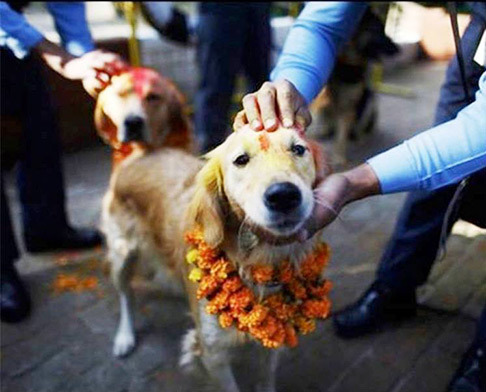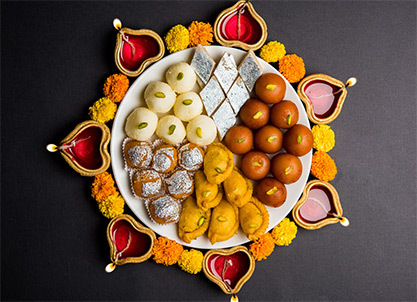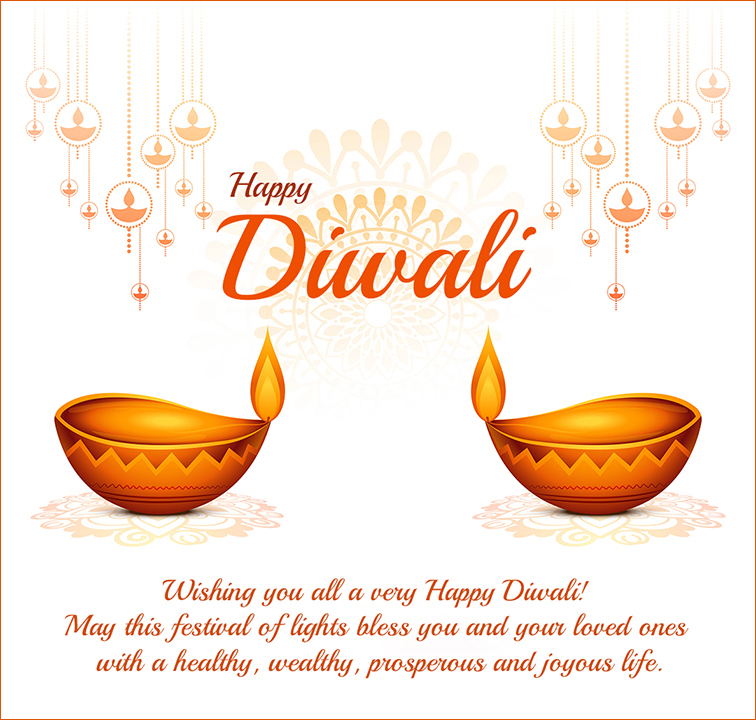The Diwali celebration dates back to ancient days in India and is believed to have grown as a fusion of the many harvest festivals in the country. It is mentioned in Sanskrit texts as early as the 1st millennium BC and many more texts later, including those of historians and travelers from Persia and beyond.
The festival has a different significance in various religious faiths of India. Sikhs celebrate Diwali as the day when Guru Hargobind Ji, the Sixth Sikh Guru, was freed from imprisonment. Jains marks the day of nirvana, or spiritual awakening, of Lord Mahavira, while Buddhists celebrate Diwali as well. People in the southern part of India celebrate it as the day when Lord Krishna killed the demon Narakasura. In western India, it is the day when Lord Vishnu, the Preserver, sent the demon King Bali to rule the basal world. In northern India, it is the day when we celebrate King Rama's return to Ayodhya after he defeated Ravana, by lighting rows of clay lamps. The festival also has a great significance with the business communities of India (also known as Baniyas) as the festival marks the beginning of a new accounting year for them and Goddess Lakshmi (Goddess of wealth and purity) is worshipped.
 In Nepal, Diwali is observed as Tihar, with a five-day grand celebration. The first day of this festival is Kag Tihar. On this day crows are worshipped as the vehicle for Yamaraj, the god of death. On the second day, dogs are revered, while on the third day the cow and Goddess Lakshmi are worshipped. On the fourth day, the Newar community mark their New Year.
In Nepal, Diwali is observed as Tihar, with a five-day grand celebration. The first day of this festival is Kag Tihar. On this day crows are worshipped as the vehicle for Yamaraj, the god of death. On the second day, dogs are revered, while on the third day the cow and Goddess Lakshmi are worshipped. On the fourth day, the Newar community mark their New Year.
In Sri Lanka, Land of King Ravana, Diwali is one of the most celebrated festivals. The Festival of Lights denotes warding off all the shadows of darkness and bringing light into one's life and home. It has a glorious significance, for it symbolizes the victory of good over evil forces. Homes are decorated with little clay lamps, buildings and streets are illuminated in celebration, and devotees wear new clothes and give each other gifts, usually of sweets.
It is fascinating that no matter where Diwali is celebrated, there's one common theme & motto: the victory of good over evil!
The five-day festival is incomplete without food! Apart from lights, the delicious food adds colours and flavour to the spirit of the festival.
 From the tempting gooey barfis to the peppery mathris, each state of India has its unique way of making Diwali flavor some. The second day of the festivities is the big day of buying and sharing sweets. Many people visit friends and family on this day and exchange sweets as gifts.
From the tempting gooey barfis to the peppery mathris, each state of India has its unique way of making Diwali flavor some. The second day of the festivities is the big day of buying and sharing sweets. Many people visit friends and family on this day and exchange sweets as gifts.
When you talk about Diwali, how can one miss the grand old celebration in one of the world's oldest cities, Varanasi! Soon after 15 days of the grand Diwali celebration, Varanasi celebrates Dev Diwali (or Diwali of the Gods), on the 15th lunar day of Kaartik. According to legends, this is the day when Lord Shiva defeated the Tripurasurs and to celebrate his triumph, the gods lit oil lamps.
 According to legends, this is the day when Lord Shiva defeated the demon Tripurasurs and to celebrate his triumph, the gods lit oil lamps.
It is an auspicious day when all the gods are believed to descend from heaven to Lord Shiva's town Kaashi (Varanasi) on the banks of the Ganges to celebrate Dev Diwali. It is a beautiful five days long festival where almost all the 87 Ghats in Varanasi are decorated with thousands of diyas (oil lamps)!
According to legends, this is the day when Lord Shiva defeated the demon Tripurasurs and to celebrate his triumph, the gods lit oil lamps.
It is an auspicious day when all the gods are believed to descend from heaven to Lord Shiva's town Kaashi (Varanasi) on the banks of the Ganges to celebrate Dev Diwali. It is a beautiful five days long festival where almost all the 87 Ghats in Varanasi are decorated with thousands of diyas (oil lamps)!
Every festival has an underlying message for society and is celebrated to keep reminding of the path one needs to follow. Celebrate the festivals of India with us and experience the origin of existing customs and beautiful traditions while you visit the country. We, at Indo Asia Tours, are all about the handcrafted tours, memories, and moments you take out of your trip, and believe us, this escapade will be a life-changing one! Wishing you a very Happy Diwali!


 The most adored and important festival of India gets its name from the row (avali) of clay lamps (deepa), Deepawali, which we light outside our homes to symbolize the inner light that protects from spiritual darkness. It is intriguing to know that the Festival of Lights takes place on the darkest night (the first night of the new moon) of the month of Kartik in the Hindu calendar.
The most adored and important festival of India gets its name from the row (avali) of clay lamps (deepa), Deepawali, which we light outside our homes to symbolize the inner light that protects from spiritual darkness. It is intriguing to know that the Festival of Lights takes place on the darkest night (the first night of the new moon) of the month of Kartik in the Hindu calendar.
 In Nepal, Diwali is observed as Tihar, with a five-day grand celebration. The first day of this festival is Kag Tihar. On this day crows are worshipped as the vehicle for Yamaraj, the god of death. On the second day, dogs are revered, while on the third day the cow and Goddess Lakshmi are worshipped. On the fourth day, the Newar community mark their New Year.
In Nepal, Diwali is observed as Tihar, with a five-day grand celebration. The first day of this festival is Kag Tihar. On this day crows are worshipped as the vehicle for Yamaraj, the god of death. On the second day, dogs are revered, while on the third day the cow and Goddess Lakshmi are worshipped. On the fourth day, the Newar community mark their New Year.
 From the tempting gooey barfis to the peppery mathris, each state of India has its unique way of making Diwali flavor some. The second day of the festivities is the big day of buying and sharing sweets. Many people visit friends and family on this day and exchange sweets as gifts.
From the tempting gooey barfis to the peppery mathris, each state of India has its unique way of making Diwali flavor some. The second day of the festivities is the big day of buying and sharing sweets. Many people visit friends and family on this day and exchange sweets as gifts.
 According to legends, this is the day when Lord Shiva defeated the demon Tripurasurs and to celebrate his triumph, the gods lit oil lamps.
It is an auspicious day when all the gods are believed to descend from heaven to Lord Shiva's town Kaashi (Varanasi) on the banks of the Ganges to celebrate Dev Diwali. It is a beautiful five days long festival where almost all the 87 Ghats in Varanasi are decorated with thousands of diyas (oil lamps)!
According to legends, this is the day when Lord Shiva defeated the demon Tripurasurs and to celebrate his triumph, the gods lit oil lamps.
It is an auspicious day when all the gods are believed to descend from heaven to Lord Shiva's town Kaashi (Varanasi) on the banks of the Ganges to celebrate Dev Diwali. It is a beautiful five days long festival where almost all the 87 Ghats in Varanasi are decorated with thousands of diyas (oil lamps)!
 Thank you, patrons, for reposing faith in our destinations and enquiring for customised virtual destination awareness training programs. We are proud to conduct them successfully so far and are looking forward to hold similar virtual destination awareness training programs for your team or yourself or a virtual tour for your clients. Let us know the destination of your interest along with your convenient date / time and we will be happy to set up a program for you.
Thank you, patrons, for reposing faith in our destinations and enquiring for customised virtual destination awareness training programs. We are proud to conduct them successfully so far and are looking forward to hold similar virtual destination awareness training programs for your team or yourself or a virtual tour for your clients. Let us know the destination of your interest along with your convenient date / time and we will be happy to set up a program for you.



